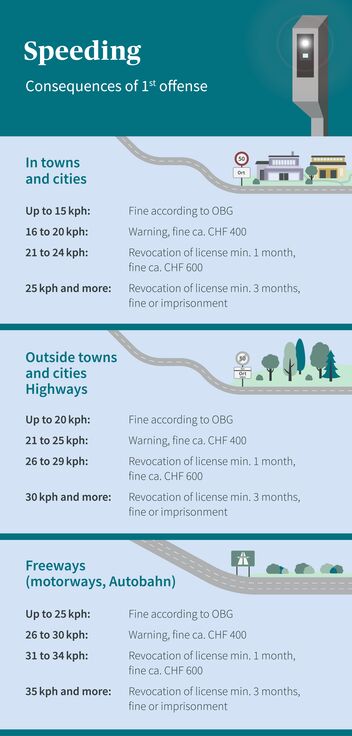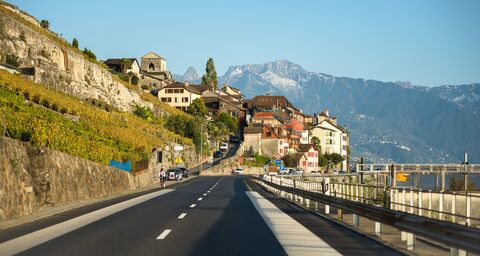
Caught speeding? These are the fines you can expect in Switzerland.
It can happen in an instant: you drive at 36 km/h through a 30 zone, or you fail to see a speed limit sign on a country road. Speeding is unfortunately all too common on our roads, and there are speed cameras lurking everywhere. We explain the fines that apply in Switzerland.
The average new car in Switzerland has 179 horsepower, which puts us in pole position in terms of power output according to the Swiss Auto Trade Association – a fair distance ahead of second-placed Germany with 153 horsepower. For some drivers, the temptation to test their car's limits and hit the gas on an empty highway at 4 o'clock on a Sunday morning is just too much to resist, but the short-lived adrenalin rush can have long-lasting consequences. If you're caught speeding in Switzerland, you can expect to face a hefty fine.
Legal consequences
The legal consequences of a speeding violation range from a fixed penalty to having your pride and joy impounded and perhaps even auctioned off, receiving a reprimand or having your license taken away for an indefinite period. Speeding is unfortunately all too common, which is why the courts judge violations systematically based on actual speed and rarely take any mitigating circumstances into account.
Swiss speeding fines
The table below shows the fines that apply for speeding in Switzerland:

Speed table
Minor speeding violations attract a fixed penalty that depends on where you were caught: in a built-up area, outside a built-up area or on the highway (item 303 in the list of penalties set out in the Fixed Penalty Ordinance (in German)). You'll face no further action once you've paid the fixed penalty.
When do I lose my driver's license?
If you were driving too fast for a fixed penalty, you're likely to face criminal charges and an administrative sanction. Depending on the actual speed, you might get a reprimand or even have your license taken away. Repeat offenders can expect to lose their license for a much longer period than first offenders.
Who is deemed to be a speeder?
You qualify as a dangerous speeder if you're caught driving 40 km/h too fast in a 30 zone, 50 km/h too fast in a 50 zone in a built-up area, 60 km/h too fast in an 80 zone outside a built-up area, or 80 km/h too fast where the limit is higher than 80. In Switzerland, this means that you'll face more than just a fine. In fact, it's a criminal offense punishable with at least a year in jail. The State can also impound your car and have it auctioned off. You'll lose your license for at least two years in the interest of public safety and then undergo a psychological assessment before you can get it back.
Conclusion
According to the 2018 SINUS Report, every third to fourth traffic accident resulting in death is due at least in part to speeding. The legal consequences are correspondingly radical. They also apply if the person concerned needs their driver's license to carry out their work. Hence it's best to drive fast where it's permitted – on the race track.






